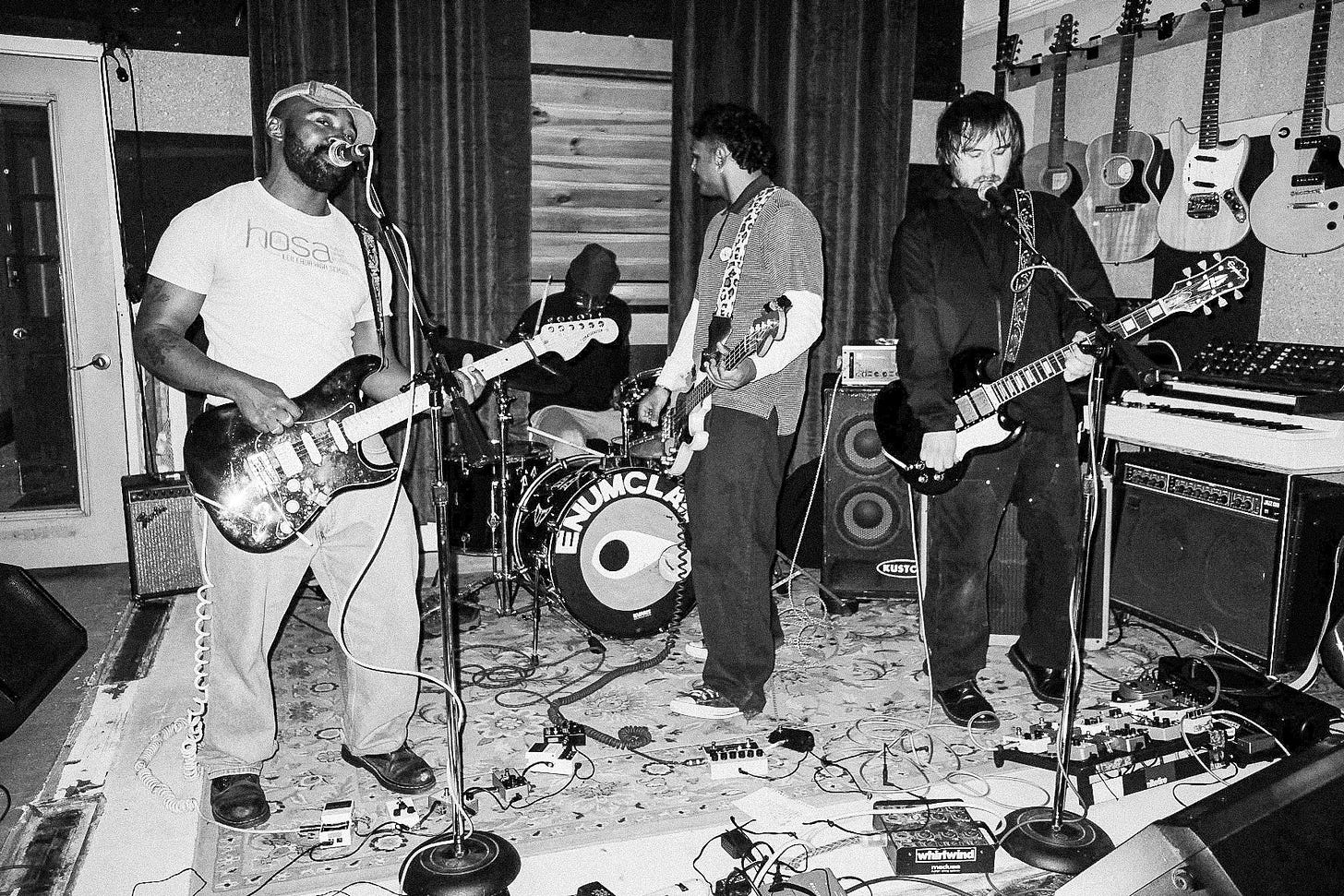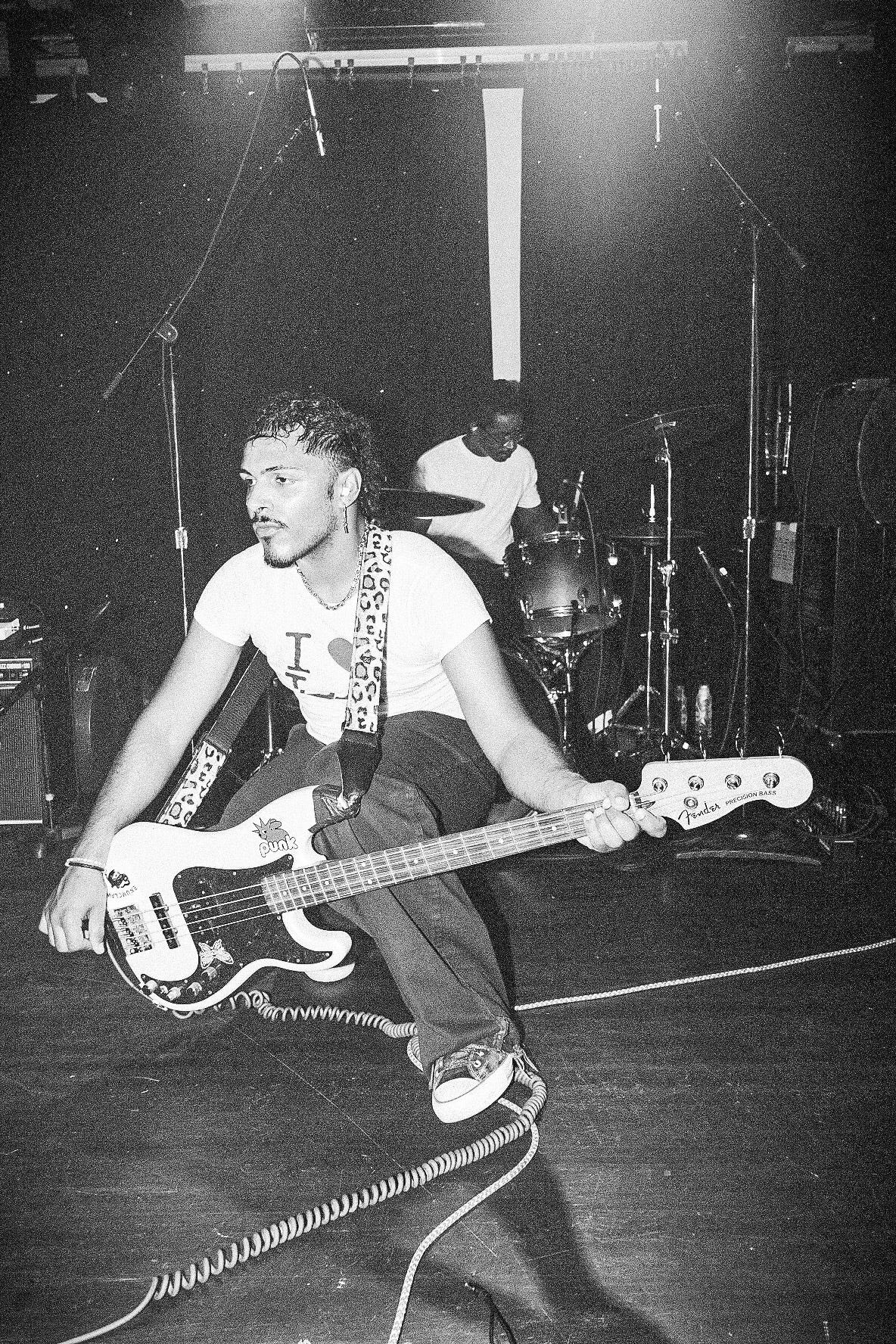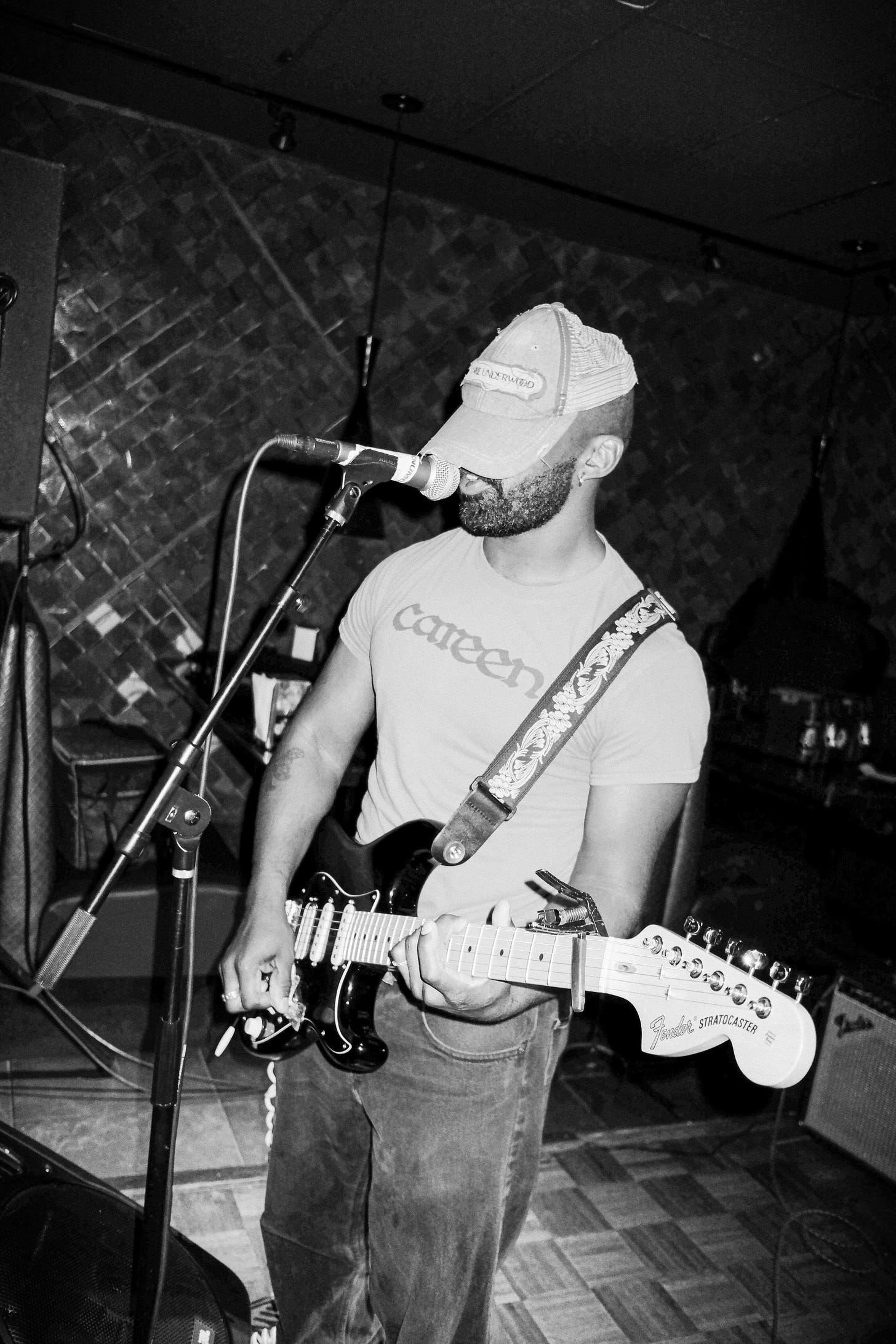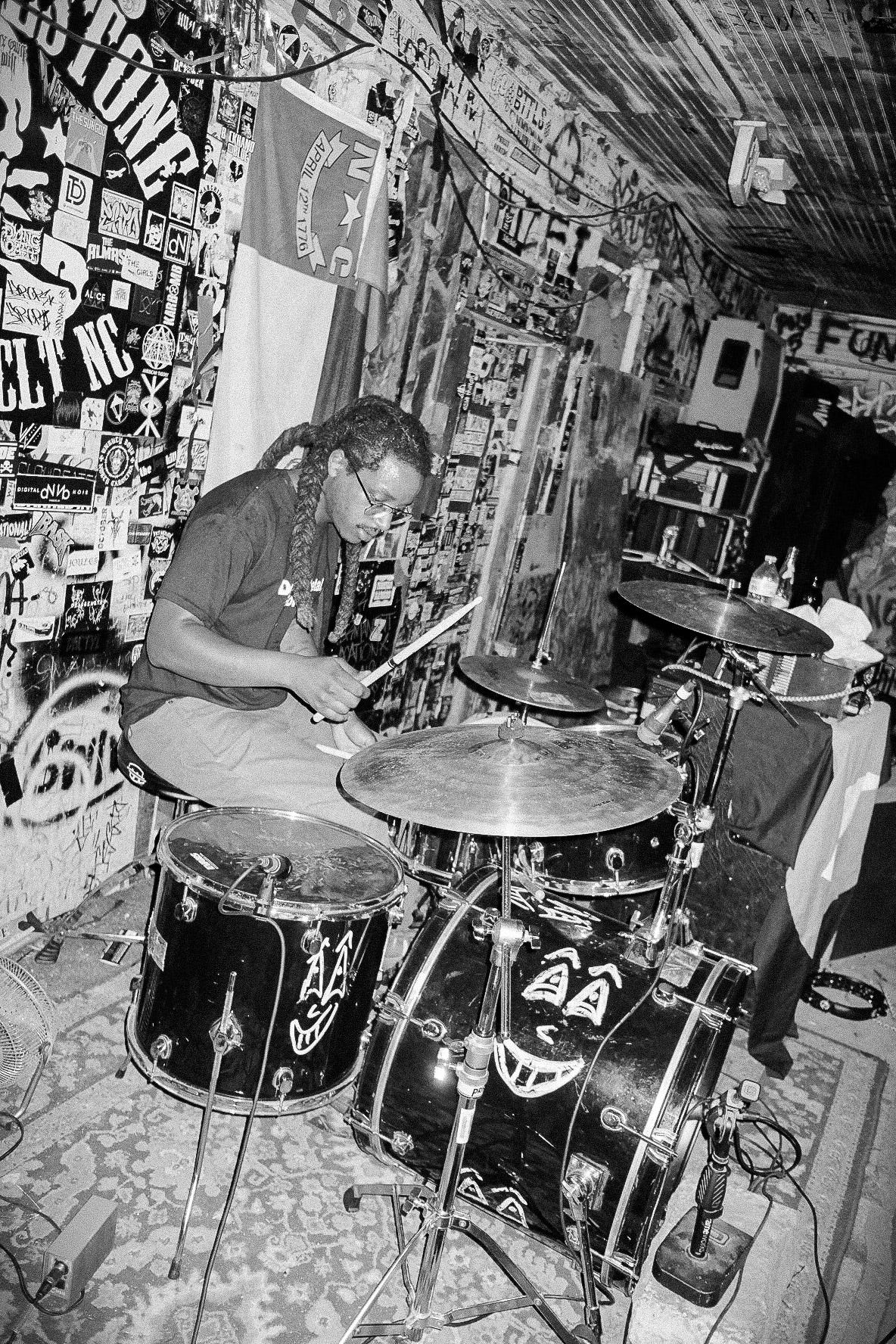“The best band since Oasis,” Enumclaw came through Minneapolis on April 17th at the combination chic-and-swanky-restaurant slash live music venue, Zhora Darling. Based out of Washington, and damn proud of it, the band originated in Bob’s Java Joint, a karaoke spot in their native Tacoma. On their “6th, maybe 7th, tour,” and now just finishing their first ever European tour, the band began in 2019; with their first studio album Save the Baby released in October of 2022. After their show, I met with the voyagers of grunge in the green room; just before they headed off to crash on the frontman of PSYLO’s couch.
Enumclaw had the captivating nonchalance (but not indifference) and style of skaters, i.e., goofy grins, perfectly baggy jeans, graphic tees that actually look good, I’m sure you know what I’m talking about. Inspired by Oasis and Nirvana, they were cool, they were rock-hard and a few of them were eating dinner with the food tickets from Zhora Darling. Clad in my new “Would you beleive it? I went to an Enumclaw show!” hoodie, I got to know Aramis Johnson (a man who seems born to front a band), Nathan Cornell, LaDaniel Gipson, and Eli Edwards. We talked about everything but music, frequently circling back on living in the internet era, “white-people-core,” and being Washingtonian.
JUNJI GREEDO: What does Enumclaw mean?
ARAMIS JOHNSON: It’s a Native American word, well, a white man’s version of a Native American word. But, it’s just a town. In Washington.
NATHAN CORNELL: Like 45 minutes from Tacoma.
JG: So, is being from Washington a big part of your band’s identity?
AJ: I would say so, yeah. I have Washingtonian pride. I think we're like… sick. I think we’re like, the top 5 Americans.
NC: We’re pretty cool.
AJ: I feel like [Washington] has so many exports. People, American institutions. Fashion-wise, trend-wise. I mean, there’s a Starbucks everywhere. Costco. Boeing.
JG: A lot of people have compared Minneapolis to Washington, Seattle specifically…
AJ: Yeah, very similar city I would say… in the demeanor of the people, like the “look.” I mean, it’s very granola. We went to the Mall of America one time, and everyone in that mall—besides like the hockey bros—looked like everyone who’d be in West Lake Union. Which is a big Seattle Mall. Have you been to the Rainforest Cafe?
JG: No.
AJ: It was too expensive. And [Eli] had a meltdown because we couldn’t go.
JG: What does being from Washington mean to you?
NC: Being from Washington means a lot I guess. I’ve lived there my whole life basically. I think it’s beautiful. Visually, it’s really inspiring. There’s always been so much music and art there, coming in and coming out. I don’t know. It’s like grey most of the year, and I think that insulated type of ecosystem makes people want to break out into something. That’s probably why so much stuff comes out of there.
ELI EDWARDS: It makes you a go-getter, that’s for sure.
NC: It used to be really blue collar, before Amazon got there.
AJ: I think that’s the part I really fuck with, we’re like… regular working class.
NC: Seattle was a railroad town, and then it became an airplane town. And now it’s a fucking tech loser town.
AJ: Moving to Seattle, I do want to say, post 2015-2016, is loser shit. It’s a place where small people fester. Like mold. People who felt small in their smaller town come to Seattle to feel big. Never have I been in a place with so many adult bullies.
JG: Adult bullies?
AJ: This is a dramatic way to put it, but I think anyone from home will agree, it’s gotten to a point where… Ok, we all grew up there. [Washington] always been liberal, always been open to anybody, in my experience. A bit I’ve been making lately is that if I eat a PB&J sandwich, and I go to a party everyone will say “Damn, you ate a PB&J sandwich? Didn’t you know Steve is allergic to peanut butter?! I can’t believe you would do that!”
NC: It’s like the internet in real life.
JG: Do you think it’s difficult to traverse rock and roll in the 21st century?
AJ: Not anymore.
EE: It’s kinda wide open I feel like.
JG: What busted it open?
[Giggles from the band] AJ: Covid and, like rap hitting a wall. At one point in time, the pioneers of culture—not just musically but artistically—were behind rap. Behind the videos, designers and photographers, videographers, things of that nature, were completely in that wheelhouse. And those people have moved genres a bit. The rappers that were popular five years ago and the rappers that are cool now are doing that same thing… The kids are interested in different things. And, with the help of TikTok.
NC: I think with Covid, people were stuck at home. So they got more into introspective music? I guess? People weren’t listening to Future and turning up—they were inside for two years. Clairo, Soccer Mommy, Alex G kept blowing up. And old bands. Turnstile got bigger; and that kind of broke out other bands. And Phoebe Bridgers becoming a pop-star for whatever reason.
AJ: [Nathan] likes Phoebe Bridgers, I don’t even know why he said that.
NC: Just the first album…
AJ: I don’t fuck with Phoebe Bridgers. It’s white people-core.
JG: Midwest Emo can be very white people-core, there was some Midwest Emo on the bill tonight.
AJ: Well, I don’t feel like we make Midwest Emo. But the other bands, yeah.
JG: How would you define your genre?
AJ: Adult contemporary. That’s what we’re rocking with.
EE: Zoomer-gaze. That’s what we’re on.
S: Are you Zoomers?
[Sadly, in unison]: No….
AJ: The generation gap isn’t as big as I thought, though. I think the Gen Z-ers are finally catching up. They are able to be human, in real life. There’s kids I know—I shouldn’t even call them kids—there are ‘people’ I know, that couldn’t hold an adult conversation when they were 17. They can talk now, but my friends and I could converse with adults when we were 17.
JG: Where do you think that gap comes from?
AJ: Our portals. Our phones… I think not in art, but as an artist, I am trying to actively rebel against my phone. I had a flip phone all summer, trying to get rid of my iPhone and stuff.
JG: Did you feel better?
AJ: Yeah! But, I have a lot of stuff going on in my life, and I was too unavailable. Which forced me to come back.
N: Tonight was really cool. Music I think, people can see themselves in it. And see a community where they are all together in real life. That phone ‘wall’ gets broken.
AJ: I was thinking about this in the van, but we live in such a white world, and everything is white-core and people have white-ass lives. If you aren’t white it can be very isolating, and a question I ask myself a bunch is, “how am I supposed to see myself in someone who doesn’t look like me and vice versa?” I think we are just trying to validate that you can be a whole person and not be white.
The Enumclaw tour continues through August, more news can be found on their instagram, @enumclaw. Their most recent EP, “These Are Some B-Sides,” is available to stream wherever you do it.








